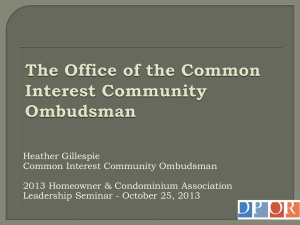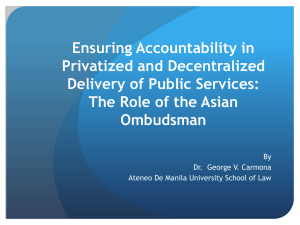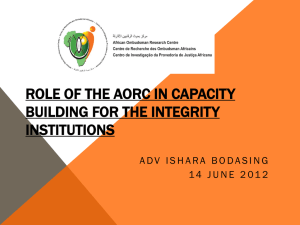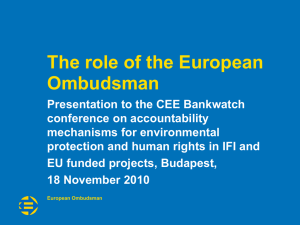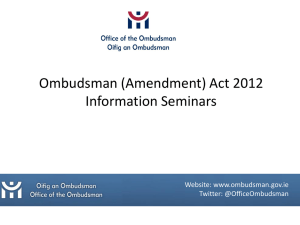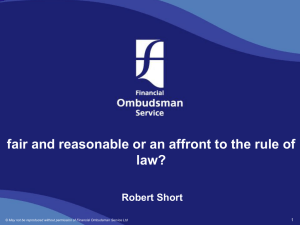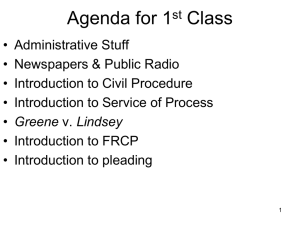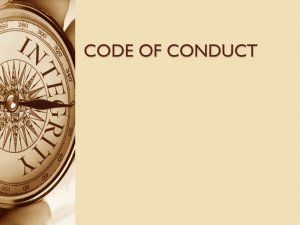OMBUDSMAN under MGNREGS
advertisement
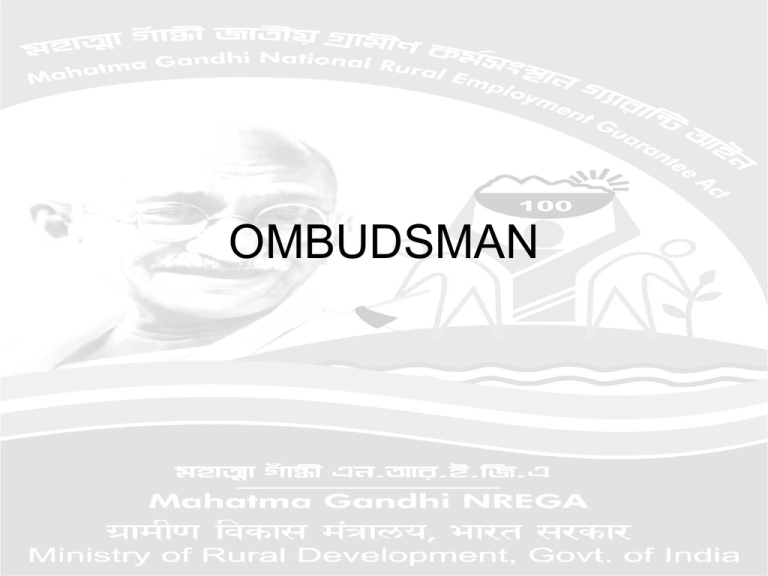
OMBUDSMAN MGNREGS Ombudsman have been formulated under Section 27 of MGNREG Act with the objective of establishing a system for redressal of grievances and disposal of complaints relating to implementation of the MGNREG Act and the Schemes made under the Act by the States. Powers • • • • • • • • • Receive complaints from NREGA workers and others on any matters specified in clause 10. Consider such complaints and facilitate their disposal in accordance with law. Require the NREGA Authority complained against to provide any information or furnish certified copies of any document relating to the subject matter of the complaint which is or is alleged to be in his possession; provided that in the event of failure of such authority to comply with the requisition without any sufficient cause, the Ombudsman may, if he deems fit, draw the inference that the information, if provided or copies if furnished, would be unfavourable to the concerned NREGA Authority. Issue direction for conducting spot investigation. Lodge FIRs against the erring parties. Initiate proceedings suo motu in the event of any circumstance arising within his jurisdiction that may cause any grievance Engage experts for facilitating the disposal of the complaint. Direct redressal, disciplinary and punitive actions. Report his findings to the Chief Secretary of the State and the Secretary, State Nodal Department for appropriate legal action against erring persons. DUTIES • • • • • To be responsible for the conduct of business in his office. To maintain confidentiality of any information or document coming into his knowledge or possession in the course of discharging his duties and not disclose such information or document to any person except with the consent of the person furnishing such information or document; provided that nothing in this clause shall prevent the Ombudsman from disclosing information or documents furnished by a party in a complaint to the other party or parties, to the extent considered by him to be reasonably required to comply with the principles of natural justice and fair play in the proceedings. To send a monthly report to the Chief Secretary and Secretary, State Nodal Department recommending appropriate action. The report shall specially highlight cases where action needs to be taken against erring NREGA functionaries for their failure to redress the grievance. The report will be accompanied with primary evidence needed to initiate action against the delinquent persons. To furnish a report every year containing a general review of activities of the office of the Ombudsman during the preceding financial year to the Chief Secretary and the Secretary, State Nodal Department along with such other information as may be considered necessary by him. In the annual report, the Ombudsman, on the basis of grievances handled by him, will review the quality of the working of the NREGA authorities and make recommendations to improve implementation of NREGA. The report shall be put on the NREGA website. To compile a list of ‘awards’ passed by it between April and March of each financial year in respect of every NREGA Authority complained against and report it to the Chief Secretary of the State and the State Nodal Department. Text of award shall also be put on the NREGA website. Grounds on which complaint shall be filed A complaint pertaining to any one or more of the following subjects alleging deficiency in the implementation of the NREG Scheme may be filed with the Ombudsman : – – – – – – – – – – – – Gram Sabha Registration of households and issue of job cards Custody of job cards. Demand for work Issue of dated acknowledgement receipt against submission of application for work. Payment of wages. Payment of unemployment allowance. Discrimination on the basis of gender. Worksite facilities. Measurement of work. Quality of work Use of machines Grounds on which complaint shall be filed • • • • • • • • • Engagement of contractors Operation of accounts in the bank or post offices Registration and disposal of complaints. Verification of muster rolls Inspection of documents Use of funds Release of funds Social audit Maintenance of record Procedure for filing the complaint • Any person, who has a grievance against the NREGA Authority, may, himself or through his authorised representative, make a complaint against the NREGA Authority in writing to the Ombudsman or to any NREGA authority superior to the authority complained against. • The complaint shall be duly signed by the complainant and his authorised representative, if any, and shall state clearly the name and address of the complainant, the name of the office and official of the Nodal Department against whom the complaint is made, the facts giving rise to the complaint supported by documents, if any, relied on by the complainant and the relief sought from the Ombudsman. • A complaint made through electronic means shall also be accepted by the Ombudsman and a print out of such complaint shall be taken on the record of the Ombudsman. • A printout of the complaint made through electronic means shall be signed by the complainant at the earliest possible opportunity before the Ombudsman takes steps for disposal. • The signed printout shall be deemed to be the complaint and it shall relate back to the date on which the complaint was made through electronic means. • No complaint to the Ombudsman shall lie if the complaint is in respect of the same subject matter which was disposed by the Office of the Ombudsman in any previous proceedings whether or not received from the same complainant or along with any one or more complainants or any one or more of the parties concerned with the subject matter. • No complaint shall be made to the NREGS Ombudsman on an issue which has been or is the subject matter of any proceeding in an appeal, revision, reference or writ before any Tribunal or Court. Disposal of complaints • On receipt of the complaint, Ombudsman may refer the complaint to the appropriate NREGA Authorities for disposal within 7 days. In the event of failure of the NREGA Authority to dispose the complaint, the matter may be taken up by the Ombudsman for disposal. • The Ombudsman shall cause a notice of the receipt of any complaint along with a copy of the complaint to be sent to the NREGA Authority complained against. • When facts of the case are admitted by the parties, the Ombudsman shall dispose the case in accordance with law. Award by the Ombudsman and Appeal • If the facts are not admitted by the parties in a case, Ombudsman may pass an award after affording the parties reasonable opportunity to present their case. He shall be guided by the evidence placed before him by the parties, the reports of social audits, if any, the provisions of NREG Act and Scheme and practice, directions, and instructions issued by the State Government or the Central Government from time to time and such other factors which in his opinion are necessary in the interest of justice. Award by the Ombudsman and Appeal • The ‘award’ passed under sub-clause (13.1) above shall be a speaking order consisting of the following components : – – – – – Details of the parties of the case. Brief facts of the case. Issues for consideration Findings against issues along with reasons. Direction to the concerned NREGA Authority such as performance of its obligations like expediting delayed matters, giving reasons for decisions and issuing apology to complainants, taking of disciplinary and punitive action against erring persons, etc. except imposition of penalties under the NREG Act. – Costs, if any. Award by the Ombudsman and Appeal • • • • • • • If a complaint is found to be false, malicious or vexatious, the Ombudsman shall, for reasons to be recorded in writing, dismiss the complaint and make an order that the complainant shall pay to the opposite party cost as deemed appropriate by the Ombudsman. A copy of the ‘award’ shall be sent to the complainant and the NREGA Authority complained against. There shall be no appeal against the ‘award’ passed by the Ombudsman and the same shall be final and binding on the parties. A representative of Programme Officer/District Programme Coordinator may appear in cases where the Programme Officer/District Programme Coordinator is a party. Programme Officer/District Programme Coordinator shall appear only when a proceeding is taken up before the Ombudsman, in which case he shall be provided the opportunity of hearing. All cases not involving complicated questions of fact or law shall be disposed within 15 days. Other cases may be disposed within 45 days. Representation of parties by the advocates in any proceeding may be made with the prior permission of Ombudsman. In any proceeding before the Ombudsman, if the facts reveal a case of illegal gratification, bribery or misappropriation and the Ombudsman is satisfied that the case is fit for further investigation by a criminal court, the same shall be referred by him to the authority competent to sanction criminal prosecution of the persons involved in the case. The competent authority on receipt of such a case shall forward the case to appropriate authority for further action in accordance with law. Amount received to be deposited in the State Employment Guarantee Fund All sums payable by the parties to the Ombudsman and received by him shall be deposited in the account of the State Employment Guarantee Fund. OMBUDSMAN FOR JALPAIGURI UNDER MGNREGS SRI ASOK KR. MAITI A-24/4, SRABANI ABASAN, BLOCK-FC SECTOR III, SALT LAKE, KOLKATA – 700106 PH. NO. 9433766606 / 2358-3870 STATE LEVEL MONITOR (SLM) FOR JALPAIGURI UNDER MGNREGS SRI SUSHIL KR. PAL RETD. SPL. SECRETARY TO THE GOVT. OF WB TALPUKUR THIRD LANE,BAGBAZAR, P.O.: CHANDERNAGORE, HOOGHLY – 712136 EMINENT CITIZEN FOR JALPAIGURI UNDER MGNREGS SRI RAJKISHORE MISHRA RECEIPIENT OF ROZGAR JAGRUKTA PURASKAR, 2009 PH. NO. 9437047270 E-MAIL: rajkishormishra@gmail.co
